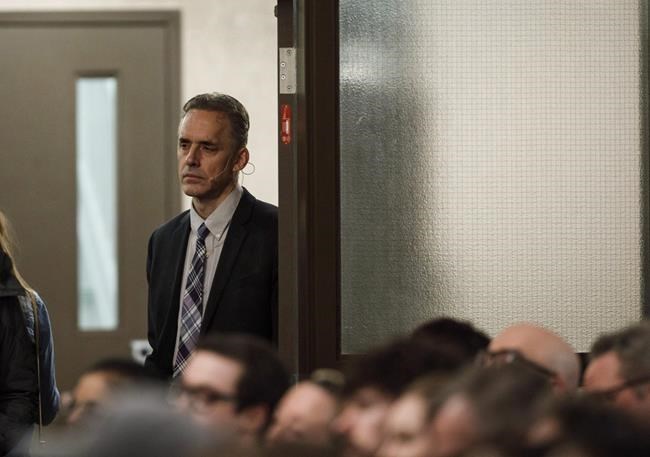TORONTO — An Ontario court has ruled against controversial psychologist Jordan Peterson, upholding a regulatory body's order that he undergo social media training or potentially lose his licence to practice.
In a decision released Wednesday, three Ontario Divisional Court judges unanimously sided with the College of Psychologists of Ontario in a case stemming from some of Peterson's contentious language and online statements.
Justice Paul Schabas wrote that the college's order that Peterson undergo a program on professionalism in public statements balanced its mandate to regulate the profession, "is not disciplinary and does not prevent Dr. Peterson from expressing himself on controversial topics."
Peterson had said his statements were not made in his capacity as a clinical psychologist, but instead were "off-duty opinions" – an argument the court rejected.
"Dr. Peterson sees himself functioning as a clinical psychologist 'in the broad public space' where he claims to be helping 'millions of people,'" Schabas wrote.
"Peterson cannot have it both ways: he cannot speak as a member of a regulated profession without taking responsibility for the risk of harm that flows from him speaking in that trusted capacity."
Peterson, a retired University of Toronto psychology professor, rose to prominence through his polarizing YouTube videos critiquing liberal culture and his successful self-help book, "12 Rules for Life: An Antidote to Chaos."
Since at least 2018, the governing body of Ontario's psychologists — of which Peterson has been a registered member since 1999 despite having stopped seeing patients in 2017 — has received complaints regarding Peterson's online commentary on a range of issues, from gender transition to climate change.
Specific complaints listed in the case before the divisional court included posts directed at Canadian politicians, a plus-sized Sports Illustrated model and transgender actor Elliot Page.
Last November, the college's complaints committee found Peterson "may be engaging in degrading, demeaning, and unprofessional comments" related to an appearance on "The Joe Rogan Experience" podcast, where he identified himself as a clinical psychologist and appeared to demean a former client. The college's ethics code requires members to use respectful language and not engage in "unjust discrimination."
The complaints committee concluded that some of Peterson's comments posed "moderate risks of harm to the public" including "undermining public trust in the profession of psychology" as well as the college's ability to regulate the profession. It then ordered the social media coaching program at Peterson's expense, emphasizing that failure to comply could result in an allegation of professional misconduct.
Peterson filed for a judicial review, arguing his political commentary is not under the college's purview and that the college failed to balance its mandate with his right to freedom of expression.
Schabas said the college pursued a reasonable option by ordering the remedial coaching, which both maintained its professional standards while having minimal impact on Peterson's constitutional free speech rights.
"The panel concluded, reasonably, that Dr. Peterson’s behaviour raised a moderate risk of harm to the public," Schabas wrote.
The prescribed coaching would focus on Peterson's "unprofessional language" and would not prevent him from expressing himself on issues he or his audience care about, the judge wrote.
Citing a clear and transparent review process from the college, previous warnings it had made to Peterson about his language and his "unwillingness to acknowledge the (complaints committee's) concerns," Schabas dismissed the judicial review application and ordered Peterson to pay the college $25,000.
Peterson took to social media site X, formerly known as Twitter, on Wednesday to comment on the ruling, which he said allowed continued "prosecution" by the college.
"If you think that you have a right to free speech in Canada You're delusional," he wrote.
The day prior, he had posted, "I stand by what I have said and done."
The college said it will review the court ruling and take next steps in accordance with its mandate and the legal process.
"The College of Psychologists of Ontario is committed to carrying out its mandate of protecting the public interest by regulating the practice of psychology and upholding the Standards of Professional Conduct," it wrote in a statement.
The case was watched closely by free speech advocates and regulators in other professions. It featured interveners including the Canadian Civil Liberties Association, the College of Physicians and Surgeons of Ontario, and LGBTQ+ advocacy group Egale Canada.
The CCLA said Wednesday that while it does not endorse Peterson's views, "freedom of expression is a right that no individual gives up just because they join a regulated profession."
The Canadian Constitution Foundation, also granted intervener status in the case, said it thought the decision "could have a chilling effect on people in other regulated professions, like doctors, lawyers, teachers and accountants."
Egale Canada welcomed the ruling.
"The Court reaffirmed that freedom of expression does not insulate health professionals from accountability for discriminatory and anti-trans speech," the organization's lawyers said in a statement.
This report by The Canadian Press was first published Aug. 23, 2023.
Tyler Griffin, The Canadian Press

